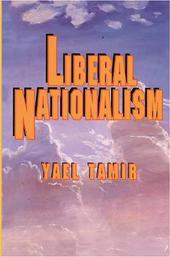
|
Liberal Nationalism
Paperback / softback
Main Details
| Title |
Liberal Nationalism
|
| Authors and Contributors |
By (author) Yael Tamir
|
| Series | Studies in Moral, Political, and Legal Philosophy |
|---|
| Physical Properties |
| Format:Paperback / softback | | Pages:206 | | Dimensions(mm): Height 254,Width 197 |
|
| ISBN/Barcode |
9780691001746
|
| Classifications | Dewey:320.5401 |
|---|
| Audience | | Professional & Vocational | | Tertiary Education (US: College) | |
|---|
|
Publishing Details |
| Publisher |
Princeton University Press
|
| Imprint |
Princeton University Press
|
| Publication Date |
23 July 1995 |
| Publication Country |
United States
|
Description
"This is a most timely, intelligent, well-written, and absorbing essay on a central and painful social and political problem of out time."--Sir Isaiah Berlin "The major achievement of this remarkable book is a critical theory of nationalism, worked through historical and contemporary examples, explaining the value of national commitments and defining their moral limits. Tamir explores a set of problems that philosophers have been notably reluctant to take on, and leaves us all in her debt."--Michael Walzer In this provocative work, Yael Tamir urges liberals not to surrender the concept of nationalism to conservative, chauvinist, or racist ideologies. In her view, liberalism, with its respect for personal autonomy, reflection, and choice, and nationalism, with its emphasis on belonging, loyalty, and solidarity are not irreconcilable. Here she offers a new theory, "liberal nationalism," which allows each set of values to accommodate the other. Tamir sees nationalism as an affirmation of communal and cultural memberships and as a quest for recognition and self-respect.Persuasively she argues that national groups can enjoy these benefits through political arrangements other than the nation-state. While acknowledging that nationalism places members of national minorities at a disadvantage, the author offers guidelines for alleviating the problems involved using examples from currents conflicts in the Middle East and in Eastern Europe. Liberal Nationalismis an impressive attempt to tie together a wide range of issues often kept apart: personal autonomy, cultural membership, political obligations, particularity versus impartiality in moral duties, and global justice. Drawing on material from disparate fields--including political philosophy, ethics, law, and sociology--Tamir brings out important and previously unnoticed interconnections between them, offering a new perspective on the influence of nationalism on modern political philosophy.
Author Biography
Yael Tamir is Senior Lecturer in Philosophy at Tel-Aviv University. A founding member of the Israeli peace organization Peace Now, she has also been active in the civil rights movement in Israel.
Reviews"As this century staggers to its balkanized end, it is harder than ever to believe, with Mazzini, that liberal principle can be reconciled with nationalism, or that national liberation can ever have liberal results. It is against this brutal historical background that one begins to appreciate the daring of Yael Tamir's enterprise... This is a book of philosophy that illuminates the real world... [An] intelligent and humane work."--Michael Ignatieff, The New Republic "Tamir constructs a philosophical ideal of nationalism, but in leading the reader to questions such as this, she also performs a valuable service for those who try to understand its reality."--Liah Greenfeld, American Political Science Review "One hopes that her argument here will lead liberal states to reexamine their obligations to all citizens of the world, not just those within their borders."--David McCabe, Commonweal "Yael Tamir has made an important theoretical contribution to a crucial debate that should interest anyone trying to come to terms with contemporary politics. It is a mark of her achievement that one finishes the book willing to credit the non-oxymoronic nature of the term 'liberal nationalism' and, thus, to accept the possibility that [one is not forced] to choose between these."--Sanford Levinson, Ethics
|